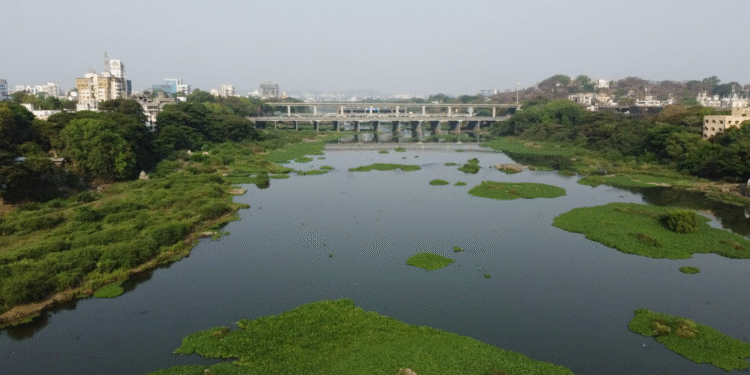Pune: The Mula River development initiative is under fire from environmentalists and citizens who claim that ongoing work along the riverbanks is putting native wildlife and bird species in serious danger. Activists allege that the project violates the Wildlife Protection Act, 1972, by disrupting the natural habitat of protected animals such as the grey mongoose, Indian flying fox, Russell’s viper, cobra, monitor lizard, and Indian flapshell turtle.
In addition to these species, various local birds and native fish are also believed to be at risk due to the construction activities. Conservationist Anand Paranjpe has demanded an immediate cessation of the project and the removal of encroachments along the river’s edges. He stressed the need to preserve the biodiversity-rich stretch from Wakad to Sangvi and urged authorities to restore the natural riverine environment.
Paranjpe raised these concerns in a letter addressed to Pimpri-Chinchwad Municipal Commissioner Shekhar Singh. Citing a complaint filed on March 7 by Vandana Chaudhary on the PMOPG portal, he noted that the Ram-Mula confluence should be declared a ‘Community Reserve’ or Devrai. The Mula River improvement project, which spans 88 kilometres across both banks, passes through ecologically sensitive areas that host a wide range of wildlife.
Despite clear directives from the divisional commissioner, critics say the Pune and Pimpri-Chinchwad civic administrations have shown little urgency in addressing the ecological impact of the riverbank beautification.
In response to citizen pressure, the Pune Municipal Corporation has expressed openness to conserving the Ram-Mula confluence and intends to work alongside the Forest Department to establish it as a protected Devrai. This decision follows environmental complaints submitted to the Ministry of Environment, Forests, and Climate Change.
The River Rescue Action Committee, along with other citizen groups, continues to demand greater transparency, environmental responsibility, and community participation in river development efforts. They have consistently advocated for conservation-based planning over destructive construction.
The Maharashtra Pollution Control Board (MPCB) has issued formal notices to several departments, including the Environment Department of PMC, the chief engineer of PCMC, and the executive engineer of the Khadakwasla Irrigation Division. These notices warn against activities such as dumping soil and stones in the riverbed, diverting the natural flow of the Ram and Mula Rivers, and causing unauthorised encroachments—all of which pose a threat to the ecological balance of the region.
These regulatory actions were prompted by detailed complaints submitted by environmentalists Shailaja Deshpande, Shubha Kulkarni, Pushkar Kulkarni, and Prachi Wakale to the Ram and Mula River Management and Restoration Committee, which includes members from both Pune and Pimpri-Chinchwad civic bodies.
Despite widespread public opposition, the PCMC has not paused the work. Around 2,000 people recently participated in a protest march along the Mula River in Pimple Nilakh, expressing strong objections to what they described as the destruction of the river’s natural environment. The demonstrators raised issues such as illegal tree cutting, unauthorised riverbed filling, and sand mining.
Maharashtra Legislative Assembly Deputy Speaker Anna Bansode met with the protestors and instructed the municipal commissioner to immediately halt the project. However, Commissioner Shekhar Singh stood firm, asserting that all necessary approvals were in place and confirming that the work would proceed as planned.
As the conflict between development and conservation deepens, concerned citizens and environmental activists continue to call for a more balanced, ecologically sensitive approach to urban river restoration.



















